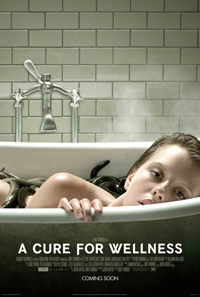Reviews
A Cure for Wellness | Review
Do Capitalists Dream of Electric Eels?: Verbinski’s Visits Mountains of Madness in Paranoia Escapade
 Not unlike his more renowned yet equally studio inveigled colleague Christopher Nolan, director Gore Verbinski has a particular penchant for imbuing glossy franchise material with tangible substance in between the development of his own high concept vehicles. His latest, A Cure for Wellness, belongs to the latter camp, an overstuffed, head scratching paranoid thriller with shades of horror and sci-fi thrown in for sometimes confounding measure. Moody and effective up to a certain point, this two-and-a-half hour genre mash-up deserves credit for ambition and inspired homage, at least until it stumbles while speeding headlong at breakneck pace into manic nightmare mode, which might have been credited as Kafkaesque had its narrative taken the time to formulate some meaningful subtext. As it stands, it’s a whirling, smirking, mischievous feeling thrill ride, albeit one whose final resting place feels like Edgar Allan Poe handed over for the bottle for a handful of hallucinogens.
Not unlike his more renowned yet equally studio inveigled colleague Christopher Nolan, director Gore Verbinski has a particular penchant for imbuing glossy franchise material with tangible substance in between the development of his own high concept vehicles. His latest, A Cure for Wellness, belongs to the latter camp, an overstuffed, head scratching paranoid thriller with shades of horror and sci-fi thrown in for sometimes confounding measure. Moody and effective up to a certain point, this two-and-a-half hour genre mash-up deserves credit for ambition and inspired homage, at least until it stumbles while speeding headlong at breakneck pace into manic nightmare mode, which might have been credited as Kafkaesque had its narrative taken the time to formulate some meaningful subtext. As it stands, it’s a whirling, smirking, mischievous feeling thrill ride, albeit one whose final resting place feels like Edgar Allan Poe handed over for the bottle for a handful of hallucinogens.
Lockhart (Dane DeHaan) is a rising executive with a successful New York financial firm, though not averse to cutting corners to make it to the top. His company is about to finalize a successful merger which would make them one of the most powerful entities on the Eastern seaboard, except Pembroke, the CEO, has had some kind of emotional breakdown and isolated himself at a mysterious wellness spa in the Swiss Alps. Due to some shady dealings Lockhart employed on his last notable venture, the board of directors insistently assigns him the responsibility of retrieving Pembroke. Upon arrival, Lockhart is told seeing Pembroke would be an impossibility, and when he attempts to return to New York, a fatal car accident leaves him stranded at the center with a broken leg. Slowly, Lockhart learns of the estate’s incredibly troubling history, while a waifish young woman (Mia Goth) seems to hold all the answers to the mounting strangeness around him, where the healing properties of the wellness center water seems uncontested but no one ever seems able to stay hydrated enough.
If Wes Anderson’s The Grand Budapest Hotel (or maybe Sorrentino’s Swiss Alps set Youth, 2015) were transmogrified into Scorsese’s asylum in Shutter Island (2010) you get a sense of the tone Verbinski establishes, and the initial set-up, especially after we leave behind the clunky, over-the-top clichés of the corporate sharks working alongside DeHaan’s sleep deprived CEO (the kind of soulless creatures who are lazily defined by their adherence to, among other things, racial and socioeconomic stereotyping in the boardroom), is quite promising. DeHaan is, like DiCaprio before him, a fitting subject for a protagonist whose mental and emotional stability is always wavering on questionable, despite the obviousness of something amiss at the creepy wellness center as soon as he sets foot in it.
DeHaan’s co-stars are a hodge-podge of sinister Europeans, such as the puzzle obsessed Brit Celia Imrie, or Austria’s Susanne Wuest (of Goodnight Mommy, 2014), and then there’s Jason Isaacs as Volmer, a sinister, rodent-like surname if there ever was one. And then the eels—there are enough eels to outdo the obsessive motif of Gunter Grass’ The Tin Drum, which isn’t a slight feat. If only how they fit into the toxic eco-system so tenuously built upon centuries of experimentation were explained more cohesively, perhaps A Cure for Wellness could have made its myriad of sinister moments echo well beyond their momentary grotesqueness as they unfold on the cinema screen. Operating within a studio system intently fixated on profits and business models based on past successful properties, we should perhaps be thankful Verbinski has given us at least the semblance of something new to ponder (his film, a follow-up to the disastrously received 2013 film The Lone Ranger is seeing release mere weeks after another revival of J-horror inspired Rings, which Verbinski tackled the first English language remake of in 2001), even if it plays more like a rough concept in desperate need of either efficient editing or more brazen, oddball storytelling than it delivers.
The film’s statements on how economic privileges and the subsequent emotional perversions as a result of a cultural fixation on more success, more money, and more corporate takeovers almost manages to be interesting because A Cure for Wellness touches on theories of suggested illness and obsessive success as a danger to one’s well-being. But none of these aspects manage to generate the kind of interest their outlandishness would suggest. Interesting, yes, but as a successful execution of all its ideas, A Cure for Wellness fails to reach its mark.
Verbinski’s visual flourishes (reflections off the glassy eyeballs of the handsomely placed victims of taxidermy) eventually give way to a number of increasingly disturbing set-pieces, not all of which enhance or further the narrative. Rather than delving further into the eerie historical instances of an ancient Baron who once owned the castle and insisted on bearing a child with the only pure woman in the kingdom (his sister, of course), or explaining how this translated into the modern day rift with the locals (peasants now defined as troubled working class denizens or aimless punks), Verbinski and screenwriter Justin Haythe instead try to wow us with increasingly ludicrous instances which aren’t logically carried to their conclusion and forgotten so quickly perhaps we’re meant to question if they never happened.
★★½/☆☆☆☆☆
Los Angeles based Nicholas Bell is IONCINEMA.com's Chief Film Critic and covers film festivals such as Sundance, Berlin, Cannes and TIFF. He is part of the critic groups on Rotten Tomatoes, The Los Angeles Film Critics Association (LAFCA), the Online Film Critics Society (OFCS) and GALECA. His top 3 for 2021: France (Bruno Dumont), Passing (Rebecca Hall) and Nightmare Alley (Guillermo Del Toro). He was a jury member at the 2019 Cleveland International Film Festival.


































